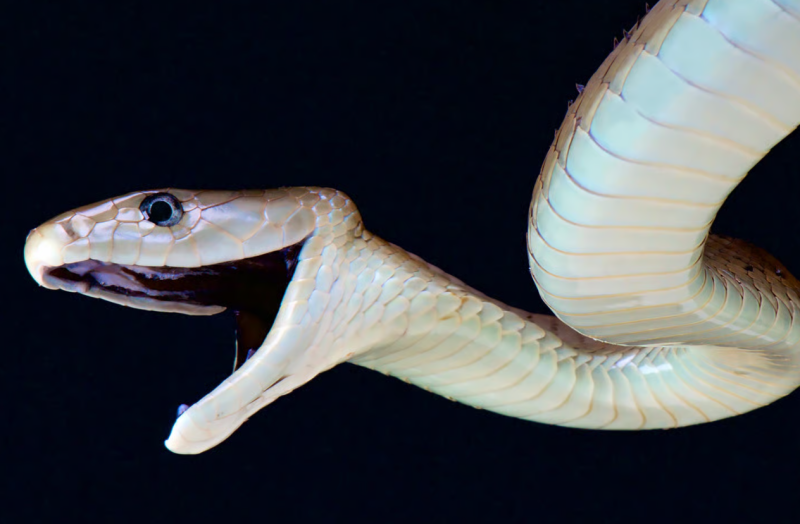Synthetic antibody could be key to a universal antivenom



By Paul McClure February 21, 2024
Synthetic antibody could be key to a universal antivenom A synthetic antibody protected against deadly venom from a large family of snakes that includes the black mambaDepositphotos View 1 Image 1/1 A synthetic antibody protected against deadly venom from a large family of snakes that includes the black mambaDepositphotos
Scientists have made a synthetic antibody that can prevent paralysis and death inflicted by the venom of elapids, a large family of mostly deadly snakes found around the world. The discovery has us slithering ever closer to developing a single, universal antivenom that could protect us against all venomous snakes.
Australia, Asia, and Africa, in particular, are home to many deadly snakes. Snakebite envenoming, the disease caused by toxins in the bite of a venomous snake, is estimated to take up to 138,000 lives each year and leaves an additional 400,000 or more people with permanent disabilities. Now, Scripps Research scientists have identified an antibody that can block the lethal effects of a major toxin produced by a number of snake species found in these countries.
"This antibody works against one of the major toxins found across numerous snake species that contribute to tens of thousands of deaths every year," said Joseph Jardine, one of the corresponding authors of the study into the antibody-based antivenom. "This could be incredibly valuable for people in low- and middle-income countries that have the largest burden of deaths and injuries from snakebites."
Most current snakebite antivenoms are derived from donor animals such as horses and sheep. A small amount of venom is injected into the animal, causing their immune system to react and release antibodies, which are harvested and purified into pharmaceutical-grade antivenom. Aside from the ethical issues associated with using donor animals (and snakes), these often-life-saving antivenoms can cause an extreme allergic reaction when given. So, the researchers set out to address these limitations.
Comparing venom proteins from various elapids, a group of about 300 mostly venomous slitherers that includes mambas, cobras, brown snakes, and kraits, the researchers found that a type of protein - three-finger toxins (3FTx) - that is present in all elapids' venom contained sections that looked similar across different species. The 'superfamily' of 3FTx proteins has various effects; many are neurotoxic, causing whole-body paralysis.
Then began the process of searching for an antibody that could block the protein. The researchers inserted the genes for 16 different 3FTx into mammalian cells, which then produced toxins in the lab. Referring to a library of over 50 billion synthetic human antibodies, they tested which ones bound to the protein from the many-banded krait, aka the Chinese or Taiwanese krait, which had the most similarities to other 3FTx proteins. That narrowed their search to about 3,800 antibodies, which were tested to see whether they recognized four other 3FTx variants. Thirty did. Of those 30, the one with the strongest interactions across all variants was an antibody called 95Mat5.
When 95Mat5 was given to mice injected with toxins from the many-banded krait, Indian spitting cobra, black mamba and king cobra, in all cases, the rodents were not only protected from death but also from paralysis. Investigating how the antibody was so effective, the researchers found that it mimicked the structure of the human protein that 3FTx normally binds to.
Because 95Mat5 is a synthetic (monoclonal) antibody, neither donor animals nor snakes are required to produce an antivenom.
"It … was exciting that we could make an effective antibody entirely synthetically - we did not immunize any animals nor did we use any snakes," Jardine said.
While it's effective against the neurotoxins in elapid venom, the researchers stress that this antibody alone isn't a universal antivenom. Snake venom is a complex cocktail; a universal antivenom requires the addition of antibodies against several major venom classes, including other groups of 3FTx proteins found in elapids and toxins commonly found in vipers. That's what the researchers are now working towards.
"Therefore, a final universal antivenom likely would require a minimum of four to five antibodies to effectively cover the additional venom classes," said the researchers. "The discovery and development of 95Mat5 is an important first step in the development of a monoclonal-based universal antivenom, because it effectively neutralizes one of the most diverse and toxic components of snake venom."
The study was published in the journal Science Translational Medicine.
Source: Scripps Research




I think with the advent of AI this sort of progress in the field of medicine is going to speed up. Our great grandkids are going to grow up in a world with far fewer medical obstacles … though humanity may destroy itself before that can happen.
That is true, just in my lifetime the advancements have been unreal and with the addtion of AI the barn door is really open, just don't let it slam on your foot.
Received antivenom as a kid after being bitten by a timber rattlesnake. At the time it was widely believed that one could only take it once in a lifetime. Asked my paramedic instructor about it years later and he advised me that that was simply a myth. Good to know.
During the ER rotations in paramedic school we all gave each other every vaccination known to exist for practice. Anti-vaxxers are insane and misinformed. Am due for my next covid update so a road trip to the nearest CVS is in my near future. Will be renting a room and making a weekend of it. Don't get to the city often these days.
Good news. Good article.